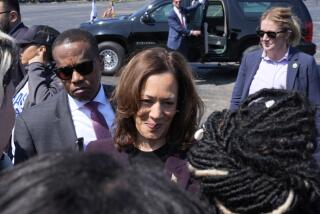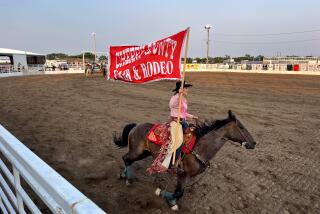Small Towns Playing a Big Role
- Share via
CHIPPEWA FALLS, Wis. — A deer with gnarled antlers peers at customers from the wall of Garnet’s Barbershop in this remote dairy town. Garnet Mathwig, who shot the deer, displays its head for the farmers and factory men who pay him $11 for a haircut.
To Mathwig and many others in the small towns of western Wisconsin, shotguns are prized possessions. So it was fitting that President Bush stopped at a hunting supply depot to showcase his support for gun rights on his recent bus trip across this side of the state. “I like to be in hunting and fishing country,” Bush told his listeners.
Yet in a region where Bush’s conservative stands on gun restrictions and other social issues should give him an edge over his Democratic challenger, Sen. John F. Kerry, the president’s reelection bid remains bedeviled by two concerns that are causing him trouble elsewhere: jobs and Iraq.
“They keep talking about all these jobs they’ve created, but where are they?” Mathwig asked as he ran scissors and a comb up the back of a customer’s head. “I don’t see any in Chippewa Falls. What are they talking about? Flipping burgers at McDonald’s?”
As for Iraq, he said, Bush “went in there with his eyes shut.” He added, “We got ourselves into a tangled-up mess over there.”
A continuing surge in new jobs nationally and the return of sovereignty to an interim Iraqi government this week appear to have done little to quell worries among many voters in the hardscrabble Chippewa Valley, an area beset this year by a wave of new layoffs.
Hundreds of jobs have vanished at Intek Plastics, American Girl, Rockwell Automation, Celestica and Mason Shoe, a mainstay employer since 1904. Now, Mason wingtips and hiking boots are relegated to a shelf at the Chippewa Falls museum.
Today, Kerry will try to tap into the area’s unease as he embarks on a weekend bus tour through the Midwest that includes stops in the Chippewa Valley and other parts of this sparsely populated corner of Wisconsin.
Kerry’s first Wisconsin stop will be just north of here at a family farm on the outskirts of Bloomer, population 3,347. Near the railroad tracks that cut through the town, the idle brick smokestack of a shuttered creamery towers over the nearby houses, a constant reminder of a time when jobs were more plentiful.
It’s a town where Fourth of July flags have fluttered for days from nearly every front porch, and where yellow ribbons are tied around every streetlamp, a gesture of hope for the safe return of U.S. troops from Iraq.
It’s also a town where the onslaught of gruesome news from Iraq has taken a toll on Bush’s popularity.
At Kirkwood’s, one of the two grocery stores in Bloomer, seventh-grade teacher Lori Trowbridge told of her horror at realizing some of her students had watched footage of one of the recent beheadings in Iraq on the Internet. She voted for Bush in 2000, but this time her choice will “totally depend on what he does with the war,” an endeavor she first backed but now considers too costly.
“Bush is pro-life, I’m pro-life,” said Trowbridge. “That’s a plus for Bush. But will I vote for him on that now? If he gets his ducks in a row and gets our boys home.”
Once an afterthought in presidential politics, the small towns scattered across Wisconsin’s rolling green hills along the upper Mississippi River have become fiercely contested turf in a state both Kerry and Bush have made a top target for November.
Wisconsin’s voters are notoriously independent, switching regularly between Republicans and Democrats in statewide elections. In modern presidential races, the state has leaned Democratic. Apart from Ronald Reagan and Richard Nixon, Democrats have carried Wisconsin in every presidential election since 1960. But Bush fell less than 6,000 votes short of winning Wisconsin in 2000.
For decades, presidential hopefuls have focused the bulk of their politicking in Wisconsin on the state’s eastern side: a “golden triangle” of voters concentrated around Milwaukee, Green Bay and Madison.
But after the 2000 election, Democrats and Republicans alike concluded that a key reason Al Gore narrowly won Wisconsin was Bush’s lackluster support in the small towns on the state’s western side.
Gore drew enormous attention campaigning there on a riverboat trip with his running mate, Sen. Joe Lieberman of Connecticut. Despite Bush’s natural affinity with the region’s socially conservative voters, he lost all eight Wisconsin counties along the Mississippi River, as well as five adjacent counties.
“If the Bush campaign can’t pick up a couple of these counties, I don’t think they can bank the state of Wisconsin,” said Sara Rogers, political director of the Wisconsin AFL-CIO.
Indeed, state Republican Chairman Rick Graber said Bush’s campaign bus tour in May through Prairie du Chien, La Crosse and other nearby towns reflected the area’s strategic importance. He also said Bush had good reason to emphasize cultural issues that could resonate with voters in those communities.
“The gun issue is a very significant issue up that way,” Graber said.
The Bush campaign pressed that approach on Thursday, organizing a news conference with Republican congressmen from the Midwest attacking Kerry’s record on guns and abortion.
Rep. Mark Kennedy of Minnesota called attention to Kerry’s “F” rating from the National Rifle Assn. and his support for abortion rights. Kerry is sure to face similar assaults in the months ahead, not just from Bush’s campaign, but also from the NRA and Wisconsin Right to Life.
The Massachusetts senator has cast himself as a supporter of both gun control and hunters’ rights. To allay hunters’ fears last fall, he invited the media to watch him shoot pheasant in Iowa, an outing ridiculed by Wayne LaPierre, executive vice president of the NRA. LaPierre pledged an aggressive campaign against Kerry in Wisconsin and other hunting states.
Still, conversations with voters in the Chippewa Valley this week suggest the dominance of the Iraq war and the economy in the campaign has diminished the potency of such cultural issues.
At the Chippewa Falls post office, Bill Bueller, 57, who works nearby at the Fill-Inn Station restaurant, cited Iraq as the most important issue in the race. A hunter who voted for Bush in 2000, he said gun control was not a key issue for him.
He said he was weighing whether to vote for Kerry, but needed to know more about his stands on Iraq and healthcare.
Discussing Iraq, Bueller said that despite the transfer of sovereignty, he expects the violence there to “stay the same, or get worse.”
He added: “The thing with Bush, I think he -- if not lied -- stretched the truth and manipulated the people to get us to go there unsupported by other countries of the world.”
But Kerry faces a steep challenge in persuading voters in this part of Wisconsin to overlook their cultural differences with him. Few were familiar with his positions, and some -- even ardent critics of the president -- had negative impressions gleaned from the attack ads that Bush has run heavily on Wisconsin television stations.
“I heard he’s kind of two-faced,” Julie Gindt, 41, a Chippewa Falls home-care worker and staunch Bush opponent, said of Kerry. “He says one thing, and then does another. He’s always changing his mind.”
To cement that impression, Bush aides noted on Thursday that in the Senate, Kerry backed a milk-pricing pact among New England states -- including Massachusetts -- that Midwest farmers saw as harmful to their dairies. But as a presidential candidate, Kerry has said he opposes the pact.
Kerry advisors said he switched positions because in the White House he would represent the whole country, not just one New England state.
To start building confidence among Wisconsin farmers, Kerry will hold a rally today at sunset on the Sonnentag family farm in Bloomer.
The Sonnentags -- Wayne, Sharon and their son, Kurt, 20 -- raise 85 cows on the farm. A sharp odor of dung fills the air outside the red barn where they milk the cows. Across a green pasture is an Assembly of God church. At a nearby farm, “Praise the Lord” is painted in huge white letters on a barn.
Kerry supporters hope several thousand people will flock to his Bloomer rally, featuring a hot-air balloon, bluegrass music and a high school band.
Beyond Chippewa County, television images of Kerry at the farm -- and at others during his bus tour -- could help him bond with small-town voters elsewhere in Wisconsin and in other battleground states, said Lawrence R. Jacobs, a University of Minnesota political scientist and an expert on presidential voting patterns in the Upper Midwest.
Like Bush’s bus tour in May, Kerry’s is also apt to attract extensive attention in small Mississippi River communities unaccustomed to the trappings of a presidential campaign.
“It’s like taking a heat coil down through this whole river valley,” Jacobs said.
More to Read
Get the L.A. Times Politics newsletter
Deeply reported insights into legislation, politics and policy from Sacramento, Washington and beyond. In your inbox twice per week.
You may occasionally receive promotional content from the Los Angeles Times.










